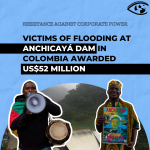Zapotec Communities Fight Électricité de France Wind Turbines in Oaxaca, Mexico
La Ventosa turbine. Photo: Laloixx. Used under Creative Commons license.
The Isthmus of Tehuantepec is one of the windiest locations in the world. Located in Oaxaca state, México, it has been historically famous as the shortest distance between the Atlantic and Pacific oceans. Today it is also the location of major conflict between Indigenous communities and wind energy companies.
A 220-kilometer stretch of land, the Isthmus is home to some of the greatest biological and ethnic diversity in México, such as the Zapotec Indigenous peoples. In 2006, the Isthmus became a major destination for investment from power producers and development banks who wanted to take advantage of its unique topography where polar winds from Canada are forced through the narrow Chivela Pass in the Sierra Madre mountains.
A total of 29 wind farms with over 1,000 turbines producing some 3,000 megawatts an hour are now in operation on the Isthmus, operated by companies like Acciona Energia, Électricité de France (EDF), Enel and Iberdrola, all of whom have launched renewable energy subsidiaries – partly, say critics, to ‘greenwash’ their brands. Today the Isthmus has become the top wind energy producing region in México, after a remarkable US$9 billion was invested into wind energy in Mexico in little over a decade, according to the Mexican Association of Wind Energy.
These wind farms are opposed by local groups like the Asamblea Popular del Pueblo Juchiteco (Popular Assembly of the Juchiteco People or APPJ), founded in 2013 and made up of students, peasants and fishermen, amongst other affected people.
“We are not against technology, we are against foreigners with money, foreign companies trying to do things with our territory without asking us,” Carlos Sanchéz Martínez, one of the leaders of the Asamblea Popular del Pueblo Juchiteco (Popular Assembly of the Juchiteco People or APPJ) told Chris Hesketh, a lecturer at Oxford Brookes university in the UK. “We are being asked to sacrifice ourselves for their pollution. It is a dispossession. We need to hold the wealthy accountable and we need to defend ourselves.”
EDF Renewables Despite its name, EDF Renewables is a subsidiary of a major fossil fuel producer – the EDF Group – which was one of the three largest gas emitters in the European Union in 2021. EDF Group is also the world’s largest nuclear operator and has previously been fined for spying on Greenpeace anti-nuclear campaigners in the UK. EDF Renewables also works in Morocco where the company signed a 2019 contract to build and operate the Noor Midelt solar project. The Moroccan government has been accused of expropriating over 2,500 hectares of land from three ethnic agricultural communities - Ait Massoud Ouali, Ait Oufella and Ait Rahou Ouali - in order to build the facilities. |
The communities point out that the electricity produced is not delivered to them – indeed the state of Oaxaca has the third highest rate of energy poverty in the country, with two thirds of the population struggling to meet their basic energy needs. Instead, it is sold to industrial users like Coca-Cola and Wal-Mart.
Critics like Global Justice Now say that the investors care nothing about “protecting indigenous cultures, enhancing local livelihoods or promoting broader access to sustainable energy.”
Some of the most controversial of these farms are operated by EDF Renewables, a subsidiary of the second-largest electricity producer in the world, Électricité de France (EDF Group). EDF Renewables owns three wind farms in close proximity in the Isthmus of Tehuantepec: the Bií Stinú wind farm in Juchitan de Zaragoza, Oaxaca, with 82 turbines that started operations in 2013; Santo Domingo wind farm (close to the town of Santo Domingo Ingenio) with 80 turbines that started operations in 2014 and La Ventosa with 27 turbines (also in Juchitan de Zaragoza) which was built with World Bank funds in 2010. The latter farm supplies electricity to Walmart stores.
A fourth wind farm – Gunaa Sicarú, which was planned for the Zapotec community of Unión Hidalgo – was canceled after community opposition. EDF had proposed to install 115 wind turbines that would generate 301.9 megawatts of power.
In October 2020, representatives of the affected community in Unión Hidalgo teamed up with Proyecto de Derechos Económicos Sociales y Culturales (ProDESC) in México city and the European Center for Constitutional and Human Rights (ECCHR) in Berlin, Germany, to file a civil lawsuit in Paris urging EDF to respect human rights.
“Our ancestral land belongs to us,” said Guadalupe Ramirez, a land activist from Unión Hidalgo, when she filed the suit. “We, as a community, have the right to decide how it is used. EDF interfered with decision-making in our community by trying to influence individual people. This led to division and violent conflict.”
In 2021, a federal court in Oaxaca court ordered the suspension of the construction of Gunaa Sicarú due to the community’s opposition. Then, in June 2022, the Méxican Federal Electricity Commission canceled the contract with EDF.
“[The ruling] of the court establishes a historical precedent in the defense of land and territory for agrarian and indigenous communities by recognizing the legal nature of the lands of Unión Hidalgo for common us,” Juan Antonio López, coordinator of ProDESC said in a press release following the ruling.
Not everyone is convinced that the victory will stop future projects though. “These legal and political triumphs of the asambleas are overshadowed by the state’s control of the processes,” writes Lourdes Alonso Serna, a former teacher in Oaxaca, in her PhD thesis at the University of Manchester. “For instance, state officials are now in charge of organising and conducting the indigenous consultations that have become powerful instruments to legitimise wind projects.”
Local groups in Oaxaca have also fought other EDF wind farms. In 2017, communal landowners blockaded the construction of Santo Domingo (previously called Cinco Palmas), demanding payment for the lease of their land by EDF Renewables. State police shut down the blockade after two months and detained eleven of the landowners, after EDF requested support. Alonso Serna noted that most of this opposition melted away, however, after EDF promised additional compensation.
But many people say the wind industry has failed the people of Oaxaca. “We’ve had years of wind projects, but poverty is the same,” Andrea Cerami, a lawyer with the Mexican Center for Environmental Law in Mexico City told the New York Times in 2016.
“When the wind companies came to the Tehuantepec Isthmus they came saying they would bring work. That they would create a lot of jobs. That the Indigenous peoples here would make a lot of money," Carlos Sánchez, a local farm activist who has campaigned against the wind farms, told Real News television in April 2023. “The population has handed over more than 74,000 acres of land to these transnational companies. And they have dismantled the local economy, unleashing a whole chain of conflicts, because of the lack of work.”



